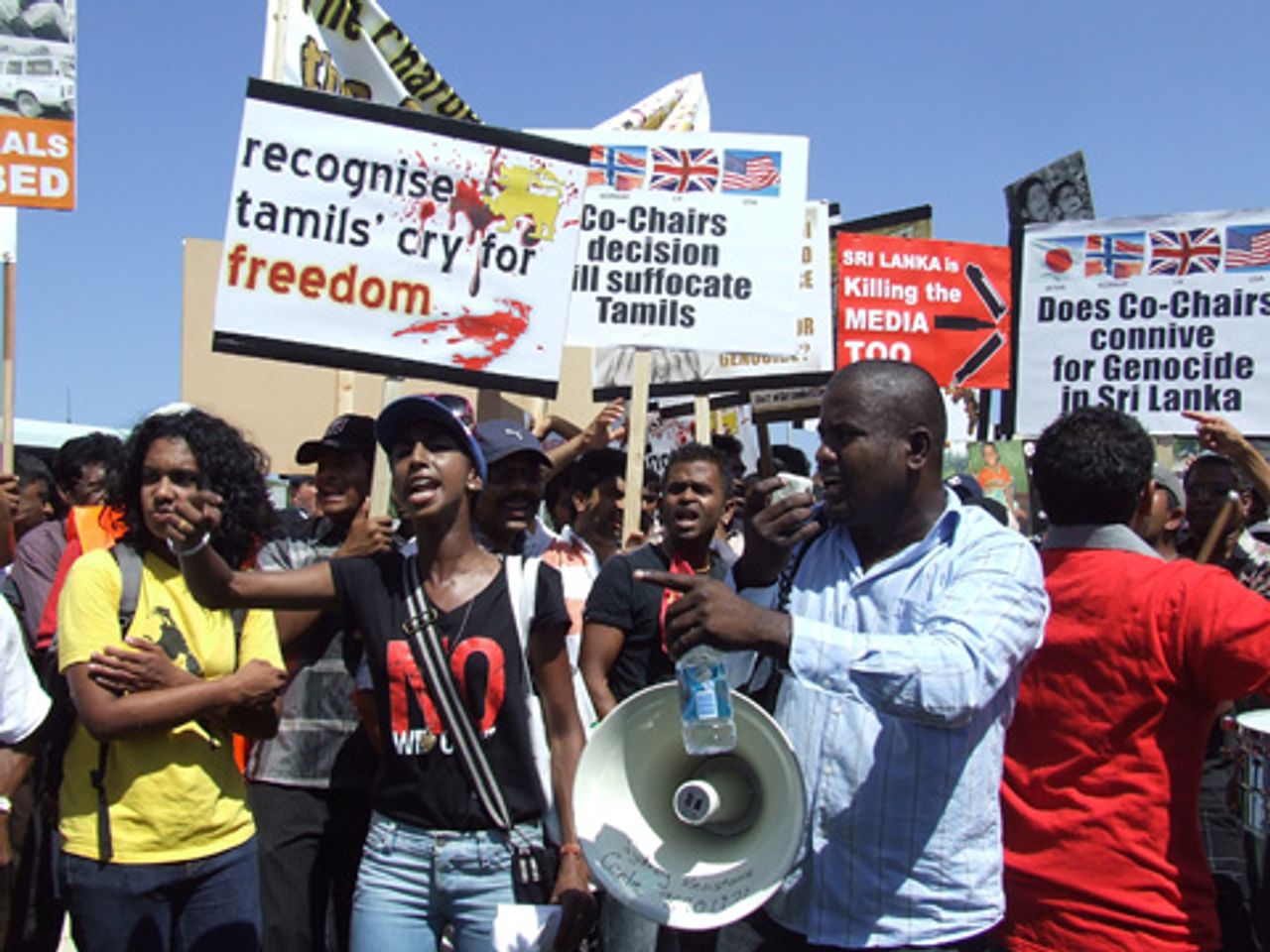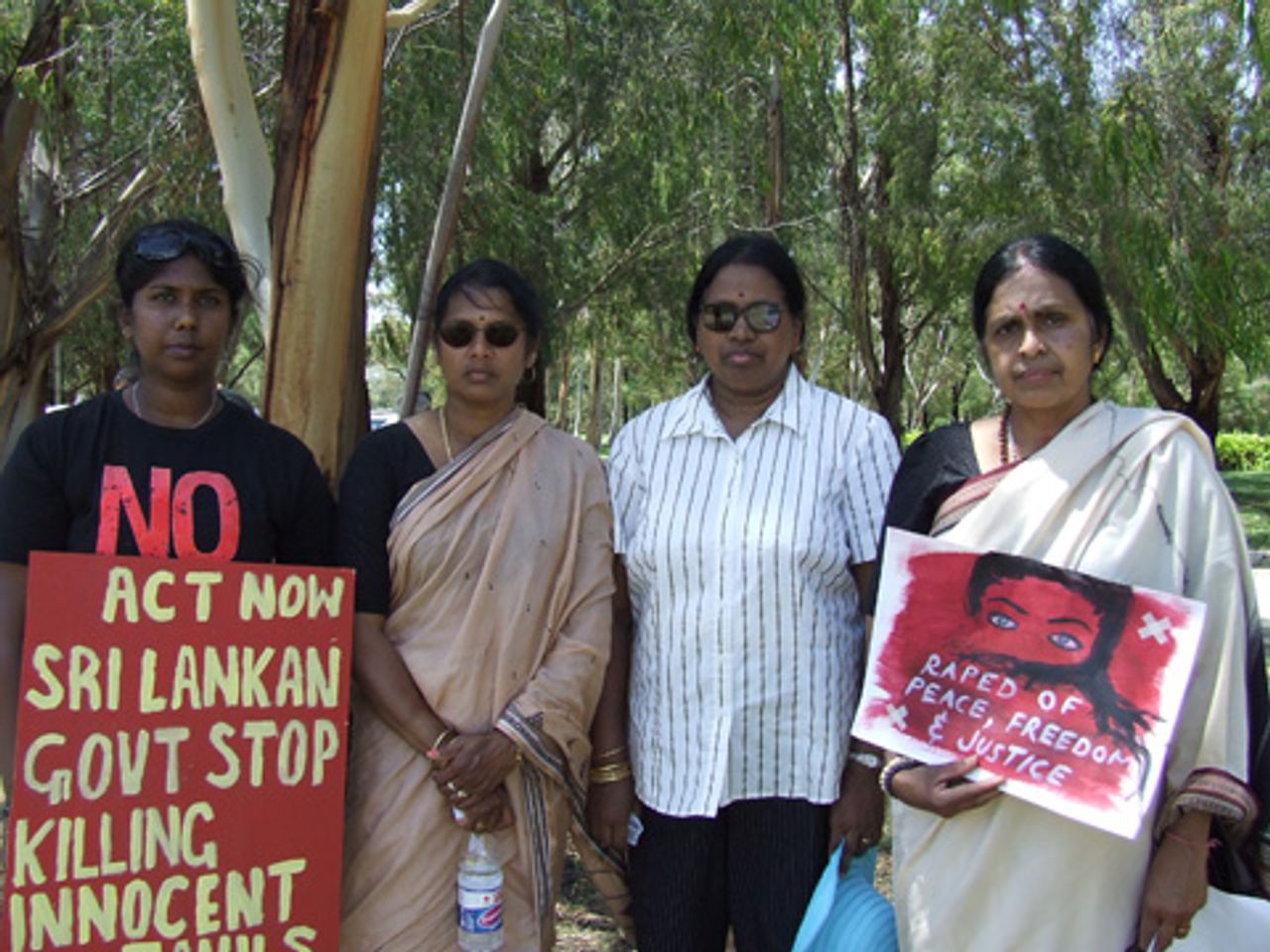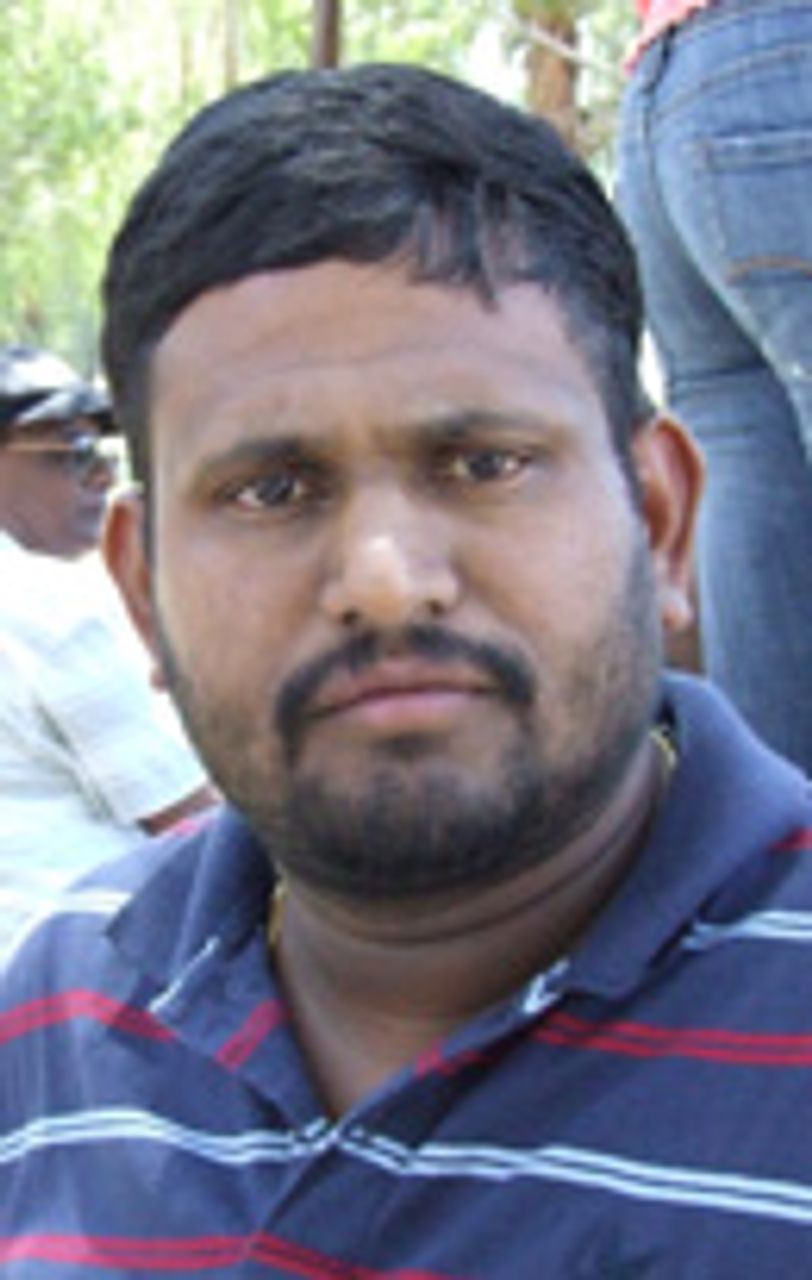More than 1,500 people gathered outside federal parliament in Canberra yesterday, demanding an end to the Sri Lankan government's brutal military offensive in the north of the island. The protest was larger than expected, with hundreds travelling from Sydney and Melbourne and some from as far away as Adelaide in South Australia.
Demonstrators included large numbers of young Tamil people, women and entire families, as well factory employees and labourers, who had taken time off work. Dozens carried placards, some with graphic images: bomb-strafed hospitals; children lying on hospital beds, their limbs amputated; villages and homes ransacked and torched.
"Sri Lanka is Killing the Media Too" were the words inscribed on several banners, a reference to the draconian censorship regime in force in Sri Lanka, designed to conceal its campaign of state violence against the Tamil population, and to the murder of journalists and government critics.
 A section of the protest
A section of the protestAccording to reports from the UN and the International Committee of the Red Cross, hundreds of Tamils have been killed in the past four weeks. The fate of up to one quarter of a million more, trapped in the jungle in the Mullaithivu district and facing sustained shelling and bombardment, is unknown.
Siva Brabaakaran from the Eelam Tamil Association in Sydney explained that so-called "protected areas" established by the Sri Lankan government were, in reality, death traps.
"More than 500 people have been killed there in the past two days alone," he said. "The government is using artillery shelling and bombing in these areas. The area we are talking about is only 200 km square. It's a very small area, sheltering 350,000 people. These people are displaced. They have no bunkers. There are more than 50,000 soldiers surrounding these people. This is a concentrated, targeted killing zone."
Demonstrators expressed their anger at the major powers. "Australia: end your silence" chanted protestors. "India: stop supporting genocide of Tamils" read one large banner.
World Socialist Web Site reporters spoke to dozens of protesters. Most were political refugees, forced to flee the 25-year communal war waged by Sri Lanka's Sinhala ruling elite.
"There are so many innocent people that are dying in Sri Lanka and the whole world is blind to it," said Jai Nathan, a 26-year-old graphic arts student who has grown up in Sydney. "As soon as someone speaks out against the government, it's a death warrant on their heads. The major powers are silent and this silence is tacit approval. My family was lucky enough to escape but that doesn't mean that I should not do something for those who have not been so fortunate."
Pointing to mass demonstrations in Europe, Jai said: "The world is finally seeing what is happening. For years it's been covered-up by the Sri Lankan government through propaganda and history being rewritten, and now the truth's coming out. They're being shown up for what they really are."
Socialist Equality Party members distributed hundreds of copies of a World Socialist Web Site statement "Troops out of north and eastern Sri Lanka!" which was eagerly received by demonstrators. Many Tamils agreed that Rajapakse's war offensive was deeply unpopular among Sinhala workers and poor farmers in the south and responded with interest to the SEP's fight for the unification of Tamil and Sinhalese workers on the basis of a socialist and internationalist program.
Thursday's rally was organised by the Australasian Federation of Tamil Associations (AFTA), a coalition of Tamil groups. Their political orientation, like that of the Liberation Tigers of Tamil Eelam (LTTE) in Sri Lanka, was directed firmly toward the imperialist powers, in opposition to any unified political struggle of the working class in Sri Lanka and internationally.
AFTA leaders marched demonstrators to the British High Commission, then to the American and Indian embassies, urging the leaders of world imperialism and the venal Indian bourgeoisie to support a United Nations Security Resolution for an immediate ceasefire. The purpose of such a ceasefire, AFTA explained, was to resume negotiations between the Sri Lankan state and the LTTE, for a negotiated settlement, to be mediated by the UN.
But such an orientation has already produced a complete dead-end for the Tamil people—and the Sri Lankan working class as a whole.
AFTA's support for the existing political establishment was also made clear in its line-up of speakers. Dr Raga Ragavan, an AFTA official from Canberra, welcomed three Labor MPs to address the crowd, including Sydney-based federal MPs Laurie Ferguson and Julie Owen. Both have large Tamil constituencies. Ragavan praised the Labor parliamentarians in the most obsequious terms. "You are the friends of the Tamils in Australia. We will bank on your support."
Far from Labor supporting the rights of Tamils, a statement issued yesterday by Foreign Affairs Minister Stephen Smith articulated the Rudd government's de facto support for the Sri Lankan government's genocidal war. This outrageous statement, entitled "Humanitarian assistance for Sri Lanka", does not identify the Sri Lankan government as the aggressor, instead calling on the LTTE to "renounce violence" and "accept the Government of Sri Lanka's offer of amnesty".
 From the left: Saambavi, Gita, Vasantha and Kamala
From the left: Saambavi, Gita, Vasantha and KamalaSaambavi, 28, travelled to Canberra from Melbourne. A former resident of Jaffna, she was forced to flee two years ago to escape the war: "This war has been going since 1972, for nearly 36 years. I suffered a lot. How can you sleep in a bomb blast and the sound of shells? You can't. I slept like that every night. I saw my relatives—dead."
Saambavi's friend Kamala explained: "This is a war to wipe out the entire race of a country. That's what's happening. India is also supporting this. They are supporting the Sri Lankan army. India is training the Sri Lankan army and there are many Indian forces in the field. We need peace. Innocent civilians are being killed. The injured are going to the hospital and being bombed at the hospital. Where can they go? The Sri Lankan government tells the people to go to the protected place, and they bomb that place. How many killed? In the last three weeks, nearly 500 civilians killed."
Viji Dhayanathan rejected the depiction of LTTE fighters as "terrorists": "What is the definition of a terrorist? The government is bombing our people by air and this is classed as acceptable. When we retaliate it is called terrorism. We are not terrorists; we are fighting for our rights.
"Officially the Sri Lankan government may kill the LTTE but what they have done is plant such hatred in our hearts, that when the war finishes, and we don't get our rights, we will be a festering problem."
Viji agreed the Rudd government was backing the Rajapakse government's actions: "It is very frustrating. But we hope seeing us here will have some impact on the consciences of the parliamentarians to change their attitude. What else can we hope?"
 Tai
TaiTai, a factory worker from Melbourne, explained he had over 50 relatives trapped in the so-called protected area in Mullaithivu, but he had not heard from them in over two months. "I don't have any messages from them. In the Vanni, no news is coming to the outside. My sisters, brothers, my uncles, my aunty, my mum. I don't hear from my mum."
Tai has been in contact with the International Committee of the Red Cross and other NGOs, but they have been unable to provide any details about his family's whereabouts.
"There is no safe area in Mullaithivu," he said. "They allow people to go into that area, and then they start bombing the people. Last night another 60 people were killed, including women and children, in the hospital."
Thursday's protest in Canberra followed a 4,000-strong demonstration the previous day in Sydney and over 3,500 in Melbourne on January 30. Last week, Tamil university students staged a three-day hunger strike in Sydney's central business district to draw attention to the humanitarian disaster unfolding in Sri Lanka.
